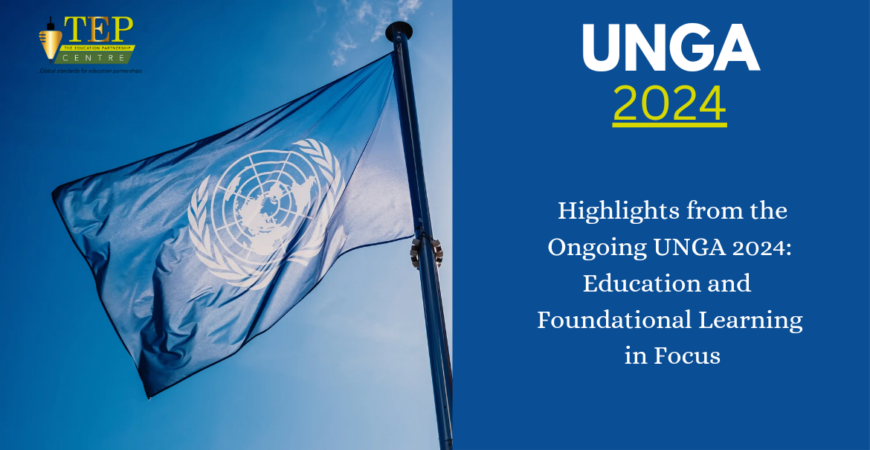Our Highlights from the Ongoing UNGA 2024: Education and Foundational Learning in Focus
As the 79th session of the United Nations General Assembly (UNGA) unfolds in New York, we at The Education Partnership Centre have been closely following key discussions that are reshaping global priorities in education. Under the theme “Unity and Diversity for Advancing Peace, Sustainable Development and Human Dignity, Everywhere and for All,” this year’s UNGA brings together world leaders, including African Heads of State and senior political figures, to tackle some of the most pressing challenges in education and development.
Foundational Learning Takes Center Stage
One of the most significant education-related events this year is the side event on foundational learning, hosted by the African Union and ADEA (Association for the Development of Education in Africa). In partnership with stakeholders such as VVOB, TaRL Africa, Hempel Foundation, UNICEF, and Human Capital Africa, this session, titled “Scaling Success: Advancing Foundational Literacy and Numeracy through Partnerships and Innovation in Africa,” focused on the urgent need to address Africa’s learning poverty.
The session highlighted several crucial points:
- Raising the salience of foundational learning: Stakeholders emphasised that foundational literacy and numeracy are the building blocks of all future learning. Without strong foundations, learners are at risk of falling behind throughout their educational journey.
- Showcasing bright spots: Various innovative interventions from across the continent were showcased, including the use of Teaching at the Right Level (TaRL) methodologies, which have been shown to significantly improve learning outcomes in countries like Nigeria, Kenya, and Zambia.
- Increasing investment in education: The event made a strong case for increasing both domestic and international funding to scale these successful interventions and meet the needs of children across sub-Saharan Africa.
Insights from the Digital Transformation Framework for Education
Another key moment during UNGA 2024 has been the launch of the Digital Transformation for Education Framework by UNESCO, UNICEF, and the Global Partnership for Education (GPE). This framework is particularly relevant to us at TEP Centre as it aligns with our focus on leveraging technology to bridge learning gaps and promote inclusivity. As highlighted during the session, low-tech solutions, such as SMS-based learning platforms, have been especially effective in Northern Nigeria, where our interventions post-pandemic have improved reading proficiency by 33.5% in 15 communities.
Strengthening Partnerships for Sustainable Education Ecosystems
At TEP Centre, we believe that partnerships are at the heart of building a stronger, more resilient education ecosystem. The PLANE (Partnership for Learning for All in Nigerian Education) program is a prime example of how working in a consortium of development organisations —funded by the UK Foreign, Commonwealth, and Development Office (FCDO)—can drive large-scale education reforms. Through this initiative, we are addressing education access disparities in regions like Kano, Kaduna, and Jigawa, where affordability remains a challenge, with over 50% of non-state schools charging less than N10,000 in tuition fees
Our work also extends to improving classroom performance by using data-driven, formative assessments. Funded by the Gates Foundation, these efforts help ensure that teachers are equipped with the right tools to understand and address the needs of each student effectively.
The Road Ahead: Accelerating Reforms
The key takeaways from UNGA 2024 reaffirm the importance of multi-stakeholder collaboration, innovation, and increased investment in education. Africa’s learning crisis is not insurmountable, but it requires immediate action. As seen from the discussions at UNGA, solutions like partnerships, digital innovation, and evidence-based interventions are critical to addressing the gaps in foundational learning, improving teacher training, and ensuring that every child receives the quality education they deserve.
At TEP Centre, we are committed to driving this change by working with our partners and continuously evolving our programs to meet the unique challenges of the African education landscape.
For more information about our work and ongoing initiatives, please visit www.tepcentre.com

